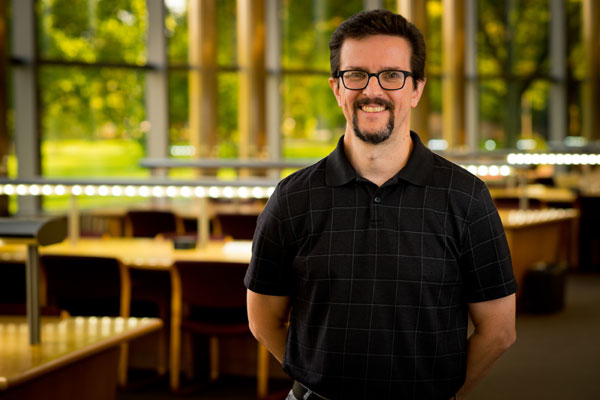UM-Flint Biology Professor Researches Brain Remodeling

University of Michigan-Flint Professor of Biology Joseph Sucic has been working on brain remodeling research for more than a decade. In this Q&A with University Relations, he explains the significance and scope of this work.
Can you summarize your research?
We are examining molecular changes that occur in the brain during what is termed brain remodeling; we are looking at changes in gene activity that occur in mice when one sense (vision) is lost due to a congenital genetic condition, which causes other senses to become more acute.
In a general sense, what causes brain remodeling? What type of molecular changes occur or does this vary widely?
Brain remodeling is caused when the brain needs to undergo "rewiring"—in other words, when new neural connections need to be formed and/or when existing neural connections need to be abolished. This requires that certain genes be "switched on" and other genes be "switched off". The specific changes that occur are still the focus of considerable research, including our current project.
How and when did this research begin?
This research began over 10 years ago—if my memory serves, it actually started around 2004. Mike Jarvinen was a new faculty member, and someone—it may have been the director of research—suggested that he and I talk as there appeared to be some potential areas for collaboration. He came to my office and we talked about our respective interests, and quickly came up with some ideas for collaborative projects. The collaboration has been in effect pretty much since then and it has been wonderful for me and my students. (Jarvinen is now at Emmanuel College in Boston).
We have published two papers (and we are currently writing a third) that featured several of my students as co-authors; in fact, one of my students (Ashley Cornett) was actually the first author on one of the papers we published, as the paper was based primarily on her master's thesis research.
What intrigued you about this research?
I was particularly intrigued that the research allowed for the integration of molecular analysis that we did in my lab with specific changes in sensory ability; that is, we documented molecular changes that occurred during changes in visual acuity, with the likelihood that the molecular events were both triggered by and contributed to the sensory differences.
What has been the process so far? What type of work do the UM-Flint students do? How many students have been involved since the project started? What do you focus on?
With Mike in Boston, the process typically works as follows. Mike uses a mouse model. He has a strain of mice that go blind after they are born due to the presence of a specific gene. He has a variety of evidence that other senses (smell, hearing) may become enhanced during and after the onset of blindness. He sends us lysates of brain tissue from various brain regions (i.e., visual cortex, olfactory cortex) from mice of differing ages.
My students and I extract either total RNA or total protein from the samples and analyze for the levels of specific RNA molecules and/or specific proteins, which indicates whether individual genes have been "switched on" or "switched off". I have had about a dozen students involved in the project over the years. Steffanie is the third graduate student to be involved.
What are the possible long-term research implications or benefits for individuals who lost vision due to congenital genetic condition?
The research could shed light on the molecular mechanisms that drive brain remodeling, which could have clinical implications in the future.
Regarding this work, what the possible implications for research overall, and for the broader community?
Regarding research overall, we could provide answers to some questions about how the brain works, and, hopefully, open up new questions and/or avenues of research.
How is this funded, and how has this helped? Has this work helped you make other academic/research connections?
We are currently funded by a grant from the National Science Foundation. Mike is the Principle Investigator (PI) on the grant and I am Co-PI. These funds have been extremely helpful, as doing the kind of molecular biology work that we do is quite expensive—it requires a great deal of expendable supplies, and the cost of those adds up quickly. For me personally, the work really hasn't given me new academic or research connections, but that could change at any time (someone who looks at our papers or who hears a presentation at a conference could reach out and the same is true for me hearing a conference presentation or reading a paper).
So far, has anything surprised you with the research? What has been satisfying about it?
So far, we haven't yet discovered anything that I would say really surprised me. Nonetheless, so many things have been satisfying about it! First, I view anything that contributes to overall scientific knowledge as extremely satisfying, so being able to publish two peer-reviewed papers has been very rewarding. Second, it has been extremely satisfying to work with students and get students experience with some contemporary research methods.
Perhaps most satisfying has been seeing the students who were involved in the project go on from UM-Flint and be successful; some are employed as research assistants (mostly in Ann Arbor), some have gone to medical school, and some have gone on to Ph.D. programs. I hope that the experience that they had working on this project helped prepare them for their current positions!
Related Posts
No related photos.
UM-Flint News
The Office of Marketing & Communications can be reached at [email protected].